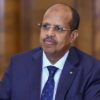DERTU, Kenya, Sep 18 – Sitting under a sprawling acacia tree, Abdulahi Bari Barrow points to his blackboard and asks the students to repeat the lesson after him. Here, there are no classrooms and no roof other than the branches, no walls other than the tree trunk which supports the blackboard, and no desk other than the straw mat laid on the sand.
This is the mobile school of the Dertu Millennium Village, a community of 6,000 pastoralists in northeastern Kenya.
In the arid landscape, stretching yellow and grey until the border with Somalia, the colored head covers worn by girls and the bright maa’uus (traditional male wrap) donned by students cut a striking note. Obediently, they repeat the English alphabet. They also learn Kiswahili and basic maths.
Not only is the curriculum special here but so are the teaching methods. Abdulahi, the only teacher, works from morning till way past sunset. When the sun is high, half of the class is present while the other half tends to the cattle and leads them to water points. When night falls, the other half catches up on the day’s lesson. In the pitch black darkness, Abdulahi lights his blackboard with a solar lamp that he recharges during the day.
His pupils also include 19 adults, seven men and 12 women. Habiba, 17, has been a regular for the last three months. Before that, she had never set foot in a school. “I’m learning to count and write because I want to have my own business later on, selling tea to camel traders,” says the pretty young woman. Her four other siblings also learn with Abdulahi.
She and the other students here belong to the Auliyahan ethnic Somali group. Camels, sheep and goats have been their livelihood for generations. In Dertu, a man’s wealth is measured in cattle heads. And as livestock need water, the community has to move often in search for the precious element. Since the children can’t go to school, the Millennium Villages Project (MVP) decided to bring the school to them. Hence the mobile school was born in May 2008, the first of its kind in Kenya’s pastoralist areas.
Every few weeks, Abdulahi loads his blackboard, books, water gallons and green tent on his camel and moves with the group, in search for greener pastures. “I am very confident, because the children can now read from A to Z…and from one to one hundred, and they can greet you, they can welcome you in different languages,” says Abdulahi, proudly, a year after the project started.
“Enrolment has increased from 13 percent to 30 percent in two years mainly because of sensitization and awareness creation and the starting of a new approach, the mobile school,” explains Ahmed Mohamed, team leader and science coordinator at the Dertu MVP.
In addition to the mobile school, the MVP has rehabilitated and upgraded a permanent school, with dormitories for boys and girls. But in this hostile environment, this success is threatened by an increasingly potent phenomenon: climate change. Already prone to droughts, northern Kenya has seen erratic rains over the last few years. Since the beginning of 2009, no rain has quenched Dertu’s parched soil. This situation has pushed the community farther away from its traditional land to look for water. Some even go as far as war-torn Somalia.
“We are really worried. Erratic rainfall and prolonged drought might increase school dropouts and as a result erode the education gains,” says Mohamed Hassan, a village elder. As the drought settles in, it becomes more and more difficult for families to provide for children, who are in turn asked to help with domestic chores while the family heads go in search of water for their cattle.
(Joelle Bassoul Mojon is a Millennium Villages Project Communications Specialist. She is based in Nairobi, Kenya)
This article was first published on http://blogs.millenniumpromise.org
http://www.youtube.com/watch?v=ApPO3wnQq_8














































